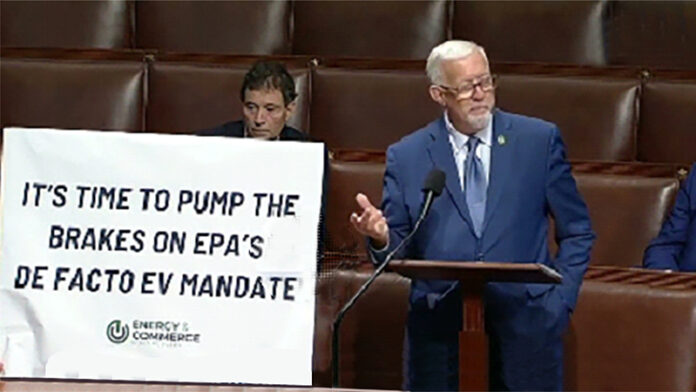Report: AUSTIN, Texas – (WASHINGTON, D.C.) – Today, I spoke on the House Floor in support of H.J. Res 136, which will end the Environment Protection Agency’s (EPA) unreasonable tailpipe emissions rule.
On March 20, 2024, the Biden-Harris Environmental Protection Agency (EPA) finalized a tailpipe vehicle emissions rule that places extreme standards on pollutants and greenhouse gasses for vehicles in an attempt to make two-thirds of all consumer vehicles zero emission by 2032 and force Americans to switch to EVs. This rule will essentially ban the sale of gas-powered and traditional hybrid vehicles gradually – forcing automakers to sell more electric vehicles and taking consumer choice out of Americans’ hands.
Electric vehicles are considerably more expensive than gas vehicles and much less reliable in cold weather and with our current grid stability, making them an unrealistic option for most American families. Americans should be able to choose which car best suits their needs and the needs of their family, not be forced to choose an EV because it’s the only option left in the marketplace.
EVs are unrealistic for many Americans:
Gas-powered vehicles continue to outperform the EVs with significant higher ranges, greater towing capacity, and they’re less susceptible to issues caused by severe weather conditions. EVs battery range can be cut by 40% in colder weather, making them completely impractical for many Americas.
The lack of vehicle charging infrastructure in many parts of the country, especially rural areas, and the time it takes to charge makes EVs impractical for many Americans.
According to the University of Michigan, “The average fully electric vehicles costs an extra $17,000 compared to as gas burning compact crossover.”
Rapid EV expansion could overwhelm the electric grid and compromise grid reliability, which would result in blackouts and other issues.
Americans don’t want to be forced to drive EVs:
A recent study found that nearly half of EV drivers want to return to traditional cars with internal combustion engines.
Reuters recently reported that J.D. Power was cutting its EV sales projection by 25% – citing increased competition in the market for gasoline-powered vehicles alternatives.
Stellantis has announced layoffs, and Ford Motor announced it was scrapping a planned three-row electric SUV and pushing back a new electric version of its best-selling pickup, the F-150, to focus on cutting costs to stimulate demand.
Ford said its EV business is on track to lose $5 billion this year alone.
I was proud to vote in support of this legislation and glad to see it pass the House of Representatives. House Republicans will always work to ensure that Americans get to choose their cars based on what’s best for them, not the Biden Administration.


